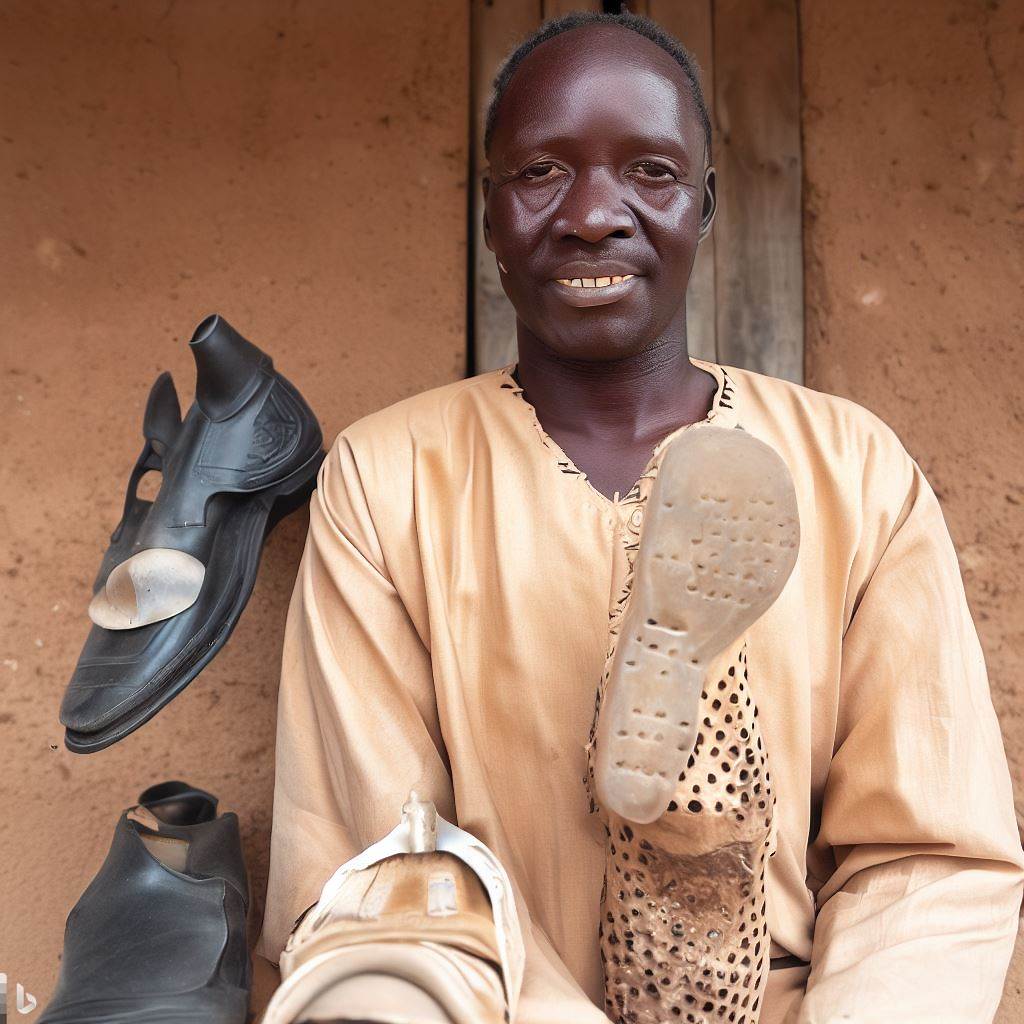Introduction
A brief overview of orthotics and prosthetics:
Orthotics and prosthetics are medical devices used to support and enhance the functioning of limbs and body parts that are impaired or missing.
These devices are custom-made or off-the-shelf and can improve mobility and quality of life for individuals with disabilities.
Importance of studying Nigerian rural perspective:
Understanding the challenges and opportunities of orthotics and prosthetics in Nigerian rural areas is crucial.
These areas often lack access to proper healthcare and specialized services, making it essential to address the unique needs of the rural population.
Exploring the challenges and opportunities of orthotics and prosthetics in Nigerian rural areas:
This blog post aims to delve into the specific obstacles faced by individuals in Nigerian rural areas who require orthotic and prosthetic devices.
By understanding these challenges, we can develop effective strategies to improve accessibility and enhance the lives of the rural population.
Understanding Orthotics and Prosthetics
Definition and types of orthotics
Orthotics are devices that are designed to support, align, and improve the function of body parts, particularly the musculoskeletal system.
They are often used to provide stability, alleviate pain, and enhance mobility in individuals with various physical conditions or injuries.
Orthotics can be classified into various types, including foot orthotics, spinal orthotics, and upper extremity orthotics.
Foot orthotics are designed to provide support to the feet, restore proper alignment, and help alleviate foot-related problems such as plantar fasciitis and flat feet.
Similarly, healthcare professionals use spinal orthotics to support the spine and treat conditions like scoliosis and spinal fractures.
These orthotic devices aid in maintaining spinal alignment and stability, promoting healing and reducing pain for individuals with specific spinal conditions.
Moreover, upper extremity orthotics are specifically designed to assist individuals with partial or total loss of hand or arm function.
Definition and types of prosthetics
Artificial devices called prosthetics replace or enhance missing body parts and aid individuals in regaining lost functionality.
Various types of prosthetics, including limb prosthetics, ocular prosthetics, and dental prosthetics, are available.
Upper limb prosthetics and lower limb prosthetics are utilized to replace amputated or congenitally missing limbs.
Additionally, ocular prosthetics are artificial eyes or eye parts employed to restore the appearance of a missing or damaged eye.
Dental prosthetics include devices like dentures and dental implants, which replace missing teeth and improve oral function.
Importance of orthotics and prosthetics in enhancing mobility and quality of life
Orthotics and prosthetics play a crucial role in enhancing mobility and improving the quality of life for individuals with disabilities.
Orthotic devices provide support, stability, and pain relief, allowing individuals to engage in activities they may have previously struggled with.
Prosthetics enable individuals to regain independence and perform daily tasks, such as walking, grabbing objects, or even participating in sports.
By improving mobility and restoring lost functionality, orthotics and prosthetics empower individuals and contribute to their overall well-being and social integration.
Role of healthcare professionals in providing orthotics and prosthetics services
Healthcare professionals, including orthotists, prosthetists, and therapists, play a crucial role in providing orthotics and prosthetics services.
Orthotists and prosthetists are trained specialists who assess patients’ needs, design, and fit orthotic and prosthetic devices.
Therapists work closely with patients to ensure proper and effective usage of orthotic and prosthetic devices, as well as provide rehabilitation services.
These professionals collaborate with doctors, nurses, and other healthcare practitioners to address the unique needs of each individual.
By understanding the specific requirements of patients, healthcare professionals can provide tailored orthotic and prosthetic solutions, thereby improving their patients’ quality of life.
Overall, orthotics and prosthetics are essential in improving mobility and enhancing the quality of life for individuals with disabilities.
The different types of orthotic and prosthetic devices cater to various needs, from foot support to limb replacement.
With the support of healthcare professionals, individuals can receive customized solutions that meet their unique requirements.
Orthotics and prosthetics not only provide functional support but also contribute to social integration and overall well-being.
The Nigerian Rural Perspective
Description of Nigerian rural areas and their characteristics
- Nigerian rural areas are predominantly agrarian with limited access to basic amenities.
- These regions are characterized by a scattered population and lack of adequate infrastructure.
- Rural communities often have poor road networks, limited electricity, and limited clean water supply.
- These areas are typically underdeveloped compared to urban centers in terms of healthcare and education.
Lack of access to healthcare facilities in rural Nigeria
- Rural Nigeria faces significant challenges in terms of access to healthcare facilities.
- There is a scarcity of hospitals, clinics, and medical professionals in these areas.
- Patients often have to travel long distances to reach the nearest healthcare facility.
- Inadequate transportation infrastructure further hampers accessibility to medical services.
Limited awareness and understanding of orthotics and prosthetics in rural communities.
- Orthotics and prosthetics are relatively unknown concepts in many rural Nigerian communities.
- There is a lack of awareness about the availability and benefits of these assistive devices.
- People with disabilities or physical impairments are often unaware of potential solutions.
- Education and sensitization programs are crucial to bridge this awareness gap in rural areas.
Impact of limited resources and infrastructure on orthotics and prosthetics services
- The scarcity of resources and infrastructure in rural areas affects orthotics and prosthetics services.
- Limited funding and equipment hinder the provision of quality assistive devices.
- There is a shortage of trained professionals who can design and fit orthotics and prosthetics.
- Rural communities also lack rehabilitation centers for proper care and follow-up.
Cultural perceptions and stigmas surrounding disabilities in rural Nigeria.
- Cultural beliefs and stereotypes contribute to stigmatization of disabilities in rural Nigeria.
- Some communities view disabilities as a punishment or result of spiritual afflictions.
- People with disabilities often face discrimination, isolation, and limited opportunities.
- Changing cultural perceptions and promoting inclusivity are essential for overcoming these stigmas.
Essentially, the Nigerian rural perspective presents unique challenges in the field of orthotics and prosthetics.
These areas lack access to healthcare facilities, have limited awareness of assistive devices, suffer from a lack of resources and infrastructure, and face cultural stigmas surrounding disabilities.
Addressing these issues requires a comprehensive approach that includes improving healthcare accessibility, raising awareness, enhancing resources and infrastructure, and promoting inclusivity in rural communities.
Only then can individuals in rural Nigeria receive the orthotics and prosthetics services they need for improved quality of life and inclusion in society.
Read: Role of Government in Orthotic and Prosthetic Care in Nigeria

Challenges and Opportunities
Lack of trained professionals in rural areas
Orthotics and prosthetics services face a major challenge in rural Nigeria – the scarcity of skilled professionals.
Currently, there is a shortage of trained orthotists and prosthetists who can provide the necessary expertise in these communities.
This lack of professionals greatly affects the accessibility of orthotics and prosthetics services in rural areas.
Read: The Journey to Becoming a Registered Nurse in Nigeria
Insufficient funding and resources for orthotics and prosthetics services
Another significant challenge is the inadequate funding and limited availability of resources for these services in rural Nigeria.
Government funding for orthotics and prosthetics is often prioritized in urban settings, neglecting the needs of rural communities.
This scarcity of resources prevents the establishment of proper facilities and procurement of necessary equipment in rural areas.
Limited educational programs and awareness campaigns in rural communities
Rural communities in Nigeria often lack educational programs and awareness campaigns on orthotics and prosthetics.
The lack of information and understanding about these rehabilitation services leads to misconceptions and stigmatization.
Moreover, the absence of awareness campaigns inhibits individuals from seeking appropriate orthotics and prosthetics assistance.
Potential partnerships between international organizations and Nigerian government to improve accessibility.
To address the challenges in rural Nigeria, potential partnerships between international organizations and the Nigerian government hold promise.
Collaborative efforts can contribute to the training of professionals, provision of funding, and establishment of sustainable clinics in rural areas.
These partnerships can enhance accessibility and ensure that orthotics and prosthetics services reach those in need throughout the country.
Role of innovation and technology in overcoming challenges of orthotics and prosthetics in rural Nigeria
Innovation and technology play a crucial role in overcoming the challenges faced by orthotics and prosthetics services in rural Nigeria.
Advancements like 3D printing can provide cost-effective and customized solutions for orthotic and prosthetic devices.
Furthermore, telehealth and telemedicine can bridge the gap by allowing remote consultations and follow-ups for patients in rural areas.
The integration of innovation and technology can greatly improve the accessibility, efficiency, and effectiveness of these services in rural Nigeria.
In short, addressing the challenges faced by orthotics and prosthetics services in rural Nigeria requires a multi-faceted approach.
Efforts should be made to train professionals, allocate adequate funding, increase educational programs, and promote awareness campaigns.
Additionally, partnerships between international organizations and the Nigerian government, along with the utilization of innovation and technology, can greatly enhance accessibility and quality of care in rural communities.
Read: Medical Lab Technician: How to Gain Experience in Nigeria
Case Studies
Highlighting successful projects and initiatives addressing orthotics and prosthetics in Nigerian rural areas
The Gait and Motion Analysis Laboratory in Enugu State has been instrumental in improving the quality of orthotics and prosthetics services in rural communities.
The lab conducts research and collaborates with local healthcare professionals to develop innovative solutions tailored to the needs of Nigerian rural populations.
One of their successful projects involved designing and implementing low-cost prosthetic limbs using locally available materials.
By utilizing 3D printing technology, they were able to create customized prosthetics that are not only affordable but also accessible to individuals in remote areas.
Another initiative focusing on orthotics is the partnership between Nigerian universities and international organizations to establish training programs for local technicians.
These programs aim to build the capacity of healthcare professionals in rural areas, equipping them with the necessary skills to provide orthotic services effectively.
The implementation of these projects and initiatives has significantly improved the availability and quality of orthotics and prosthetics in Nigerian rural communities.
Sharing personal stories and experiences of individuals benefiting from orthotics and prosthetics in these communities
Osagie, a young boy from a remote village in Nigeria, lost his leg due to a severe infection.
With the help of an orthotic limb provided by a local NGO, Osagie regained mobility and independence.
He can now attend school, play with friends, and actively participate in his community.
Aisha, a woman from a rural area, suffered from polio as a child and had difficulty walking.
Through a prosthetic leg provided by a government-sponsored outreach program, Aisha’s life has been transformed.
She can now engage in household activities and earn a living without physical limitations.
These personal stories highlight the positive impact of orthotics and prosthetics on individuals’ lives in Nigerian rural areas.
They demonstrate how access to these devices can empower individuals and improve their overall well-being.
Read: Orthotic and Prosthetic Associations in Nigeria: A Guide
Recommendations
In order to address the challenges faced by individuals with disabilities in rural Nigeria, there are several key recommendations that could greatly improve the access and quality of orthotics and prosthetics services.
A crucial step towards improving the situation is the implementation of educational programs aimed at raising awareness and understanding of orthotics and prosthetics.
These programs could be targeted at both healthcare professionals and the general public. By increasing knowledge about these assistive devices, more individuals would be able to access and benefit from them.
This includes providing necessary equipment, training healthcare professionals, and ensuring the availability of necessary materials for orthotics and prosthetics.
By investing in these resources, rural healthcare facilities can provide better services to individuals in need.
An important aspect of improving orthotics and prosthetics services is promoting cultural acceptance and inclusivity towards individuals with disabilities.
This can be achieved through community engagement programs and awareness campaigns that challenge existing stigmas and stereotypes.
By fostering a more inclusive society, individuals with disabilities would have better access to support and services.
Lastly, encouraging local and international collaborations is crucial for improving orthotics and prosthetics services in rural Nigeria.
By partnering with organizations and experts, local healthcare facilities can benefit from valuable knowledge, resources, and funding.
Collaborations can also facilitate the exchange of best practices and the development of innovative solutions tailored to the specific needs of rural communities.
In a nutshell, addressing the challenges faced by individuals with disabilities in rural Nigeria requires a multi-faceted approach.
Implementing educational programs, strengthening infrastructure, promoting inclusivity, and encouraging collaborations are all important steps toward improving orthotics and prosthetics services.
Publish Your Professional Profile, Business or Brand
Showcase your expertise, gain trust, and boost visibility instantly on Professions.ng.
Publish NowRead: Qualifications Needed to Become a Psychologist in Nigeria
Gain More Insights: Career Opportunities for Counselors in Nigeria
Conclusion
In this blog post, we explored the challenges faced by individuals in rural Nigeria in accessing orthotics and prosthetics services.
We discussed the lack of awareness, limited availability of services, and financial constraints as major barriers.
Reiterate the significance of addressing orthotics and prosthetics in the Nigerian rural perspective.
It is crucial to address the issue of orthotics and prosthetics in the Nigerian rural perspective as it directly affects the quality of life and mobility of individuals.
By improving access to these services, we can make a significant difference in the lives of people in rural Nigeria.
Call to action for individuals and organizations to support and contribute towards improving orthotics and prosthetics services in rural Nigeria.
We urge individuals and organizations to come forward and support initiatives that aim to improve orthotics and prosthetics services in rural Nigeria.
By providing funding, resources, and raising awareness, we can help ensure that no one in rural Nigeria is left without access to these essential services.
Together, we can make a difference and improve the lives of those in need.




